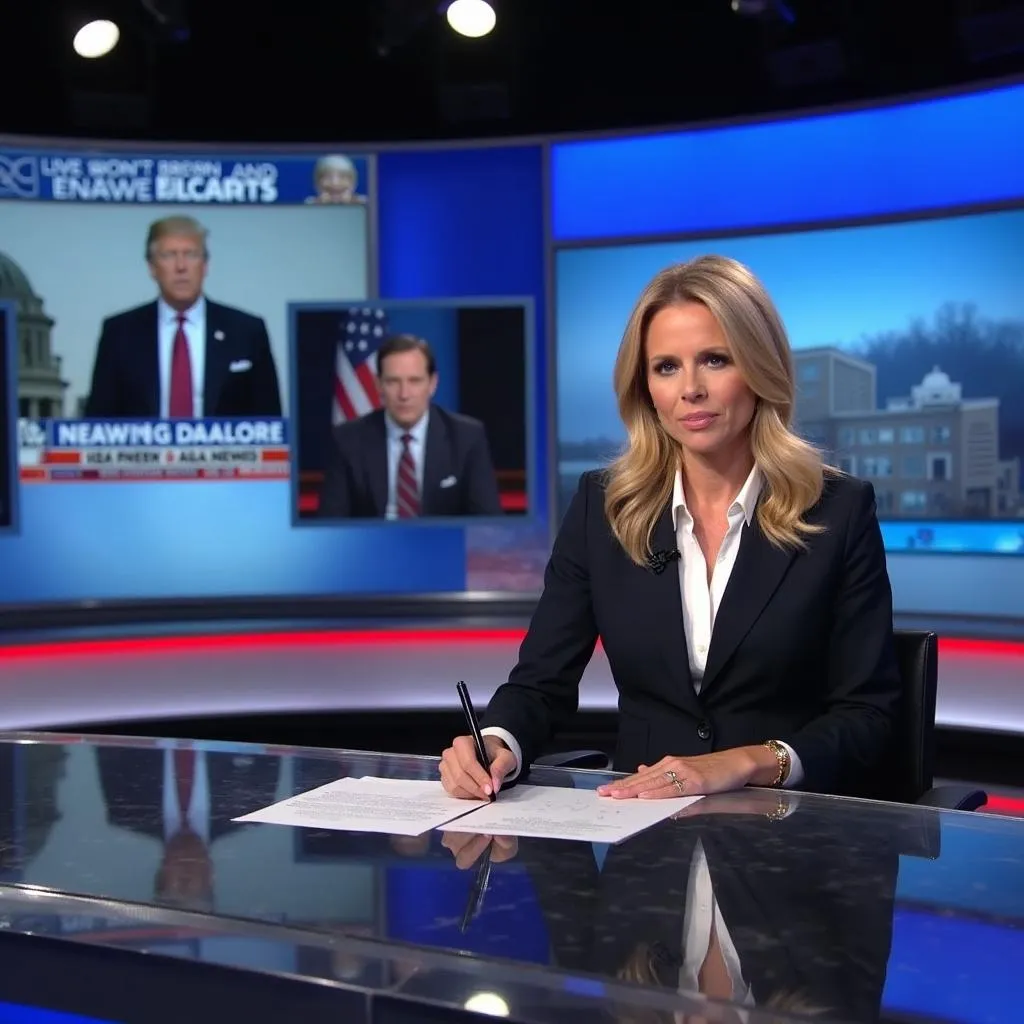The IELTS Speaking test often includes questions about media consumption, including news channels. One common topic that candidates may encounter is describing a news channel they like to watch. This article will provide sample answers and tips to help you excel in this particular speaking task, as well as general strategies for the IELTS Speaking test.
Part 1: Introduction and Interview
In Part 1 of the IELTS Speaking test, you may be asked some general questions about news and media. Here are some potential questions and sample answers:
- Do you often watch the news?
Sample answer (Band 7-8):
“Yes, I make it a point to stay informed about current events. I typically watch the news for about 30 minutes every evening, and I also browse news websites throughout the day to keep up with breaking stories.”
- What type of news interests you the most?
Sample answer (Band 8-9):
“I’m particularly fascinated by international affairs and geopolitics. I find it crucial to understand the complex relationships between countries and how global events can have far-reaching consequences. Additionally, I’m drawn to stories about scientific discoveries and technological advancements, as they often provide insights into how our world might change in the near future.”
 Person watching news on TV
Person watching news on TV
Part 2: Long Turn (Cue Card)
Here’s a sample cue card related to describing a news channel:
Describe a news channel you like to watch
You should say:
- What the channel is
- How often you watch it
- What kind of news it broadcasts
- And explain why you like watching it
Sample answer (Band 6-7):
“I’d like to talk about CNN, which is a popular news channel that I enjoy watching. I usually tune in to CNN a few times a week, especially in the evenings when I have some free time. CNN is known for covering a wide range of topics, including international news, politics, business, and sometimes even entertainment.
What I like about CNN is that they provide in-depth coverage of important events happening around the world. They often have live reports from different countries, which helps me understand the global context of news stories. I also appreciate that they have expert commentators who can explain complex issues in a way that’s easy to understand.
Another reason I enjoy watching CNN is that they have some interesting documentaries and special programs that go beyond just reporting the news. These shows often delve deeper into specific topics and provide a more comprehensive understanding of various issues.
Overall, I find CNN to be a reliable source of information that helps me stay informed about what’s happening in the world. It’s become a part of my routine to watch their broadcasts, and I feel that it helps me be a more knowledgeable and engaged citizen.”
Sample answer (Band 8-9):
“I’d like to discuss BBC World News, a highly respected international news channel that I religiously follow. I make it a point to watch their broadcasts daily, typically for an hour in the evening, and I also frequently access their content through their website and mobile app throughout the day.
BBC World News is renowned for its comprehensive coverage of global affairs, politics, economics, and cultural news. What sets it apart is its commitment to impartial reporting and its extensive network of correspondents stationed around the globe, providing firsthand accounts and nuanced perspectives on complex international issues.
One of the aspects I particularly admire about BBC World News is their unwavering dedication to investigative journalism. They often produce compelling exposés and in-depth documentaries that shed light on under-reported stories and challenge the status quo. This approach not only informs viewers but also encourages critical thinking about world events.
Moreover, I find their balanced approach to news reporting refreshing. Unlike some news channels that sensationalize stories for ratings, BBC World News maintains a level-headed tone while still conveying the importance and urgency of breaking news. They strive to provide context and multiple viewpoints on contentious issues, which I believe is crucial for fostering a well-rounded understanding of global events.
The channel’s diverse programming, including shows like ‘HARDtalk’ and ‘Global Questions’, offers incisive interviews with world leaders, policymakers, and influential figures. These programs often delve into the intricacies of international relations and illuminate the complexities of global challenges.
In essence, BBC World News has become an indispensable source of information for me. It not only keeps me abreast of current affairs but also broadens my horizons and deepens my understanding of the interconnected world we live in. Watching this channel has undoubtedly contributed to my global awareness and has inspired me to be more engaged with international issues.”
Describe a person who is very knowledgeable about current events could be an interesting topic to explore after discussing your favorite news channel, as it allows you to connect your media consumption habits with real-world examples of well-informed individuals.
Follow-up questions:
- How has your preferred news channel influenced your understanding of global issues?
Sample answer (Band 8-9):
“BBC World News has profoundly shaped my worldview by providing me with a comprehensive and nuanced understanding of global issues. Through their in-depth reporting and expert analysis, I’ve gained insights into the complexities of international relations, the interconnectedness of global economies, and the far-reaching impacts of climate change. This enhanced understanding has made me more empathetic towards different cultures and more aware of my role as a global citizen.”
- Do you think traditional news channels are still relevant in the age of social media?
Sample answer (Band 7-8):
“While social media has undeniably transformed the way we consume news, I believe traditional news channels still play a crucial role in our information ecosystem. They offer professional journalism, fact-checking, and in-depth analysis that are often lacking in social media posts. However, traditional channels need to adapt to changing viewer habits and integrate digital platforms to remain relevant and reach younger audiences.”
 News anchor reporting breaking news
News anchor reporting breaking news
Part 3: Two-way Discussion
Examiner: Let’s discuss the role of news media in society. Do you think news channels have a responsibility to educate the public?
Sample answer (Band 6-7):
“Yes, I think news channels do have a responsibility to educate the public. They are often the main source of information for many people, so it’s important that they provide accurate and helpful information. News channels should not just report what happened, but also explain why it’s important and how it might affect people’s lives. They can do this by having experts on their shows to explain complex issues in simple terms. However, it’s also important for people to be critical thinkers and not rely only on one source of information.”
Sample answer (Band 8-9):
“I firmly believe that news channels have a profound responsibility to educate the public. In an era of information overload and widespread misinformation, reputable news outlets serve as crucial gatekeepers of factual information and informed discourse. Their role extends beyond merely reporting events; they should strive to contextualize news stories within broader social, political, and economic frameworks.
By providing in-depth analysis, featuring expert opinions, and exploring multiple perspectives, news channels can foster critical thinking and enhance public understanding of complex issues. This educational function is particularly vital in democracies, where an informed citizenry is essential for meaningful civic participation.
However, it’s important to note that this responsibility comes with significant challenges. News channels must strike a delicate balance between education and entertainment to maintain viewer engagement. They also need to navigate the complexities of presenting unbiased information in an increasingly polarized media landscape.
Ultimately, while news channels have a clear duty to educate, viewers also bear responsibility for their own learning. Media literacy is crucial, and audiences should be encouraged to diversify their news sources, fact-check information, and engage critically with the content they consume. In this way, the educational role of news media becomes a collaborative effort between broadcasters and their audience.”
Key Vocabulary and Phrases for High Scores
-
To stay informed (phrasal verb): To be up-to-date with current events
Example: “I read the newspaper daily to stay informed about local politics.” -
Breaking news (noun): Very recent or happening now news
Example: “The channel interrupted regular programming to report breaking news about the earthquake.” -
To delve deeper (phrasal verb): To investigate or examine more thoroughly
Example: “The documentary delved deeper into the causes of climate change.” -
Impartial reporting (noun phrase): Unbiased and fair news coverage
Example: “The BBC is known for its commitment to impartial reporting on global issues.” -
To shed light on (idiom): To help explain or reveal information about something
Example: “The investigative report shed light on corruption within the government.” -
To foster understanding (verb phrase): To encourage or promote comprehension
Example: “Quality journalism fosters understanding between different cultures and communities.”
 Multiple news sources on various devices
Multiple news sources on various devices
Tips from an IELTS Speaking Examiner
-
Practice regularly: Set aside time each day to watch English-language news broadcasts and practice summarizing what you’ve learned.
-
Expand your vocabulary: Keep a notebook of new words and phrases you encounter in news reports and try to incorporate them into your speaking practice.
-
Develop opinions: Don’t just memorize facts; form and articulate your own opinions on current events.
-
Use a variety of sentence structures: Mix simple and complex sentences to demonstrate your language proficiency.
-
Work on your fluency: Try to speak continuously without long pauses. It’s okay to use fillers like “well” or “you know” occasionally, but don’t overuse them.
-
Be specific: Use concrete examples to support your points, especially when describing your favorite news channel or discussing the impact of news media.
-
Stay calm: Remember that the examiner is interested in your language skills, not testing your knowledge of current events. If you’re not familiar with a topic, it’s okay to say so and then speak about what you do know.
By following these tips and practicing regularly, you can improve your performance in the IELTS Speaking test, particularly when discussing topics related to news and media. Remember, the key is to demonstrate your English language skills while expressing your thoughts clearly and confidently.
Describe a person who has shaped your understanding of global issues could be an excellent follow-up topic to explore after discussing news channels, as it allows you to connect your media consumption with personal influences on your worldview.


